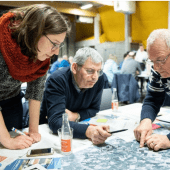STAR2Cs

Short Term Adaptation for Long Term Resilience to Climate Change
Priority Axis
Adaptation to Climate ChangeSpecific objective
Adaptation to Climate Change
Lead partner
Kent County CouncilContact
Start Date
01/09/2017End Date
31/08/2021Project budget
4 380 191 €ERDF amount
2 628 115 €ERDF rate
60%About
Common challenge
With climate change, flooding is likely to become more frequent and severe, with damages in Europe reaching €23.5bn by 2050. Given that floods are already very costly to the 2 Seas area, STAR2C’s identified a clear need to take proactive action to reduce the impact of future flooding on ecosystems, communities, and economies. Member States have developed national adaptation strategies identifying such action. However, local authorities and regional agencies tasked with implementing them were finding it challenging to deliver tangible adaptation measures. This difficulty was driven by a systemic failure to engage local stakeholders responsible for planning and decision making with adaptation due to several barriers, including; lack of understanding of long-term costs/benefits, relevant tools and capabilities to support decision making and funding for perceived ‘future’ investments. Thus, there was little appetite or ability to deliver local adaptation, creating an ‘implementation gap’ between strategy and real change.
Overall objective
Main outputs
Cross border approach
Main Achievements
STAR2Cs aimed to address the implementation gap faced by stakeholders in delivering local action to build adaptation capacity. The project produced 1 e-tool to identify and evaluate mechanisms to deliver adaptation in local scenarios, 1 knowledge and capacity building service increasing stakeholder ability for 'future proofed' decision making, 8 implementation pathways and one case study method evaluating project success.
The development and uptake of the Adaptation Catalyst is a highlight of STAR2Cs. The e-tool provides an infrastructure for stakeholders to identify and evaluate options to stimulate the implementation of necessary measures. The e-tool webpage has been viewed over 3000 times, promoted, and used widely amongst partners. It has been endorsed within the Deltares staff training programme, highlighting its wide applicability. Through the e-tool, STAR2Cs aimed to achieve a 30% increase in adaptation actions that are timed, costed, and integrated into local delivery mechanisms. Through the use of the e-tool, the project has achieved a 34% increase in the percentage of timed and costed actions integrated into local plans from national plans.
Partners collaborated to develop and use the Knowledge Service to upskill target groups to use co-creative decision-making to determine relevant adaptation measures. The partnership ran 109 workshops engaging over 3000 stakeholders. In addition, the partnership delivered 9 sets of online training with accompanying participation material. The flood risk web platform for residents in the Zwalm Valley to test and check their flood risk and exchange ideas was visited 901 times alone in 2021.
The partnership engaged over 4000 stakeholders to develop and deliver 8 locally tailored implementation pathways. Through engagement, stakeholders have been provided with locally tailored pathways for implementing action, thus improving adaptation capacity. Delivery of the pathways has resulted in a 24% increase in the percentage of adaptation actions in local plans that are being delivered, demonstrating the progress made by STAR2Cs in delivering local implementation of ‘on-the-ground’ measures across the 2 Seas area.
The project culminated in the delivery of the Case Study method evaluating success and the final conference held in June 2021. The partnership worked together to deliver an excellent event that was well attended by stakeholders. The partnership showcased the diverse range of transferable outputs delivered and received great feedback.
Testimonial

Crucially, we demonstrated that the potential of technical solutions to build adaptive capacity is maximised through effective social engagement and gaining support from policymakers and communities alike. This is something that would have been far more challenging to demonstrate without the breadth and range of expertise, approaches and experiences of the partnership. The co-creation process for developing the river contract in East Flanders, PP5’s iterative process of designing and implementing climate dialogues and preserving and harnessing collective memory of floods in France and the Netherlands to encourage action today are great examples of this. The project’s enriching experiences of knowledge exchange, discussion forums and organising cross-border action resulted in a transferable, multi-functional STAR2Cs solution that will continue to stay relevant long after the project ends.
